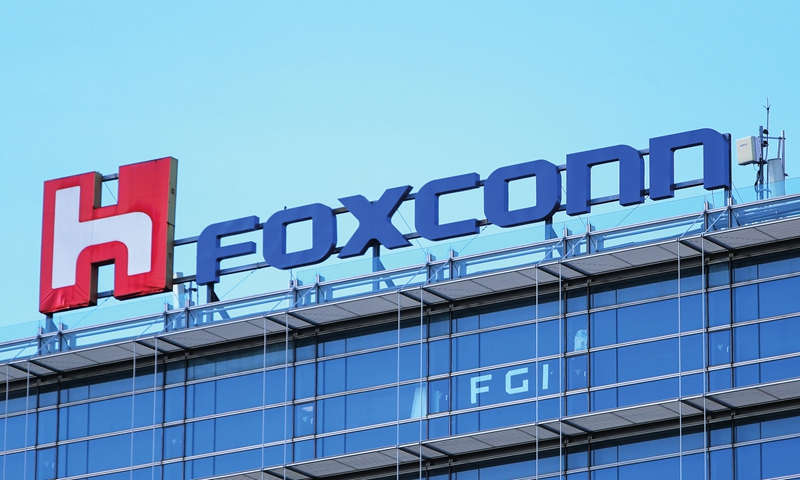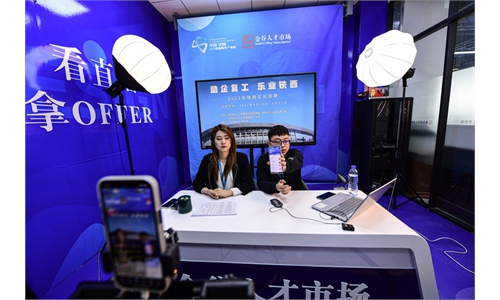Targeting Foxconn, DPP tries to cut cross-Straits ties in vain: Global Times editorial

Logo of Foxconn Photo: VCG
Taiwan's Democratic Progressive Party authorities stated on Saturday that they would impose a fine on Foxconn only because a mainland subsidiary of Foxconn held a small number of shares in Tsinghua Unigroup "without review," and the Taiwan authorities could prohibit companies from investing in the mainland based on "national" security and industrial development concerns. Although Foxconn has previously stated that it will sell all its shares, the DPP is still relentless, demanding that Foxconn provide a "complete explanation" on Monday and hinting that it is still possible to continue to impose fines on it.The matter has intensified since Foxconn disclosed equity information in July. The DPP authorities followed like a cat smelling fish. Taiwan's "Economic Affairs" and "National Security" authorities joined hands to exert strong pressure on Foxconn in an attempt to stop this investment. At that time, it was reported that Foxconn was preparing materials to be submitted for review. Before the "review" was carried out, some DPP officials revealed that "(the investment plan) will definitely not pass." Just imagine, if Foxconn invested in an American company, would the DPP authorities still impose fines? It will probably just ask Foxconn to invest more.
Foxconn's investment was forced to retreat by the DPP. It is easy to make one think of the recent establishment of a factory by TSMC in the US. TSMC went to the desert in the southwestern part of the US to set up a factory, and the total investment in the two phases will be $40 billion. The $800 million that Foxconn announced to invest in Tsinghua Unigroup is only a fraction of that. Comparing the results of the two incidents and the attitude shown by the DPP is simply ironic. The DPP authorities had failed to fool Foxconn into investing in the US, and now they want to stab it again to show their loyalty to Washington.
"Security factors" and "industrial development," these routines and rhetoric of the DPP authorities in setting thresholds in the investment field sound familiar. Since the beginning of this year, the US has frequently resorted to detrimental tactics against China in the field of technology. The DPP authorities have also followed suit, prohibiting mainland IC companies from engaging in research and development in Taiwan and claiming to ban short video platforms such as Douyin. They also conducted so-called surprise searches on mainland companies in Taiwan, claiming to prevent the mainland from poaching high-tech talents. While the DPP authorities are complacent about their role as Washington's henchmen, people and enterprises in Taiwan are paying for all this.
Taking chips as an example, in the "chip 4" alliance that Washington is seeking to form, Taiwan has the highest trade dependence on the Chinese mainland. The small island has limited resources, and the chip industry, as one of the few core industries, simply cannot stand any reckless moves. However, in the face of Washington's various self-benefiting measures to restructure the industrial chain in the name of the value alliance, the DPP authorities not only dare not say a word, but also cooperate more actively than anyone else. They have rushed to the forefront in suppressing the mainland's chip industry. Their flattery and ugly face have even made Japan, South Korea and others feel embarrassed and also put Taiwan companies in a state that lacks protection.
Nonetheless, be it at present or in the long run, the Chinese mainland is still Taiwan's largest trading partner. Cross-Straits trade volume has doubled over the 10 years, and Taiwan's trade dependence on the mainland remains high. In recent years, the mainland has concentrated its efforts in "hard-core" technology fields such as semiconductors, new energy, and high-end new materials, which has also attracted a large number of Taiwan businessmen and enterprises to lay out a new round of investments in the mainland. This makes the DPP authorities sleepless. They are afraid of cross-Straits economic integration, fearing that the mainland's tremendous economic and cultural attractiveness will easily transform into political attractiveness to the residents in the island, so they do everything possible to "decouple from the mainland" and "break the chain." Threatening to suppress Foxconn is essentially part of the "de-sinicization" pushed by the DPP authorities.
In recent years, the DPP authorities have introduced a lot of evil and unjust laws to sever the cross-Straits economic ties, setting up many obstacles for mainland companies to invest in the island and Taiwan companies to invest in the mainland. This has indeed caused some problems. However, the DPP authorities' countercurrent moves cannot change the historical trend of accelerated cross-Straits economic integration. The mainland market has huge potential and many Taiwan businessmen and enterprises have invested in the mainland. The number is several hundred in Suqian, Jiangsu Province, alone. If the DPP authorities want to bring trouble for all these enterprises, are they able to do so? Numerous Taiwan companies, including Foxconn, have gained rich returns from investing in the mainland. In contrast, for those Taiwan companies that are pressured to invest and produce in the US, how many have been successful?
This time, the DPP authorities are targeting Foxconn's investment which is only "a drop in the ocean." They are sending warnings to and intimidating other companies on the island. But political tactics cannot stop the economic law after all. In the past, Lee Teng-hui's "no haste, be patient" policy for the investment to the mainland failed to "abstain" cross-Straits economic and trade exchanges, and Chen Shui-bian's "effective management" policy also failed to "manage" cross-Straits economic and trade exchanges. What happened simultaneously with these political manipulations was a broader picture of increasingly extensive cross-Straits exchanges and cooperation. This is a historical trend that the deranged DPP authorities cannot stop.


